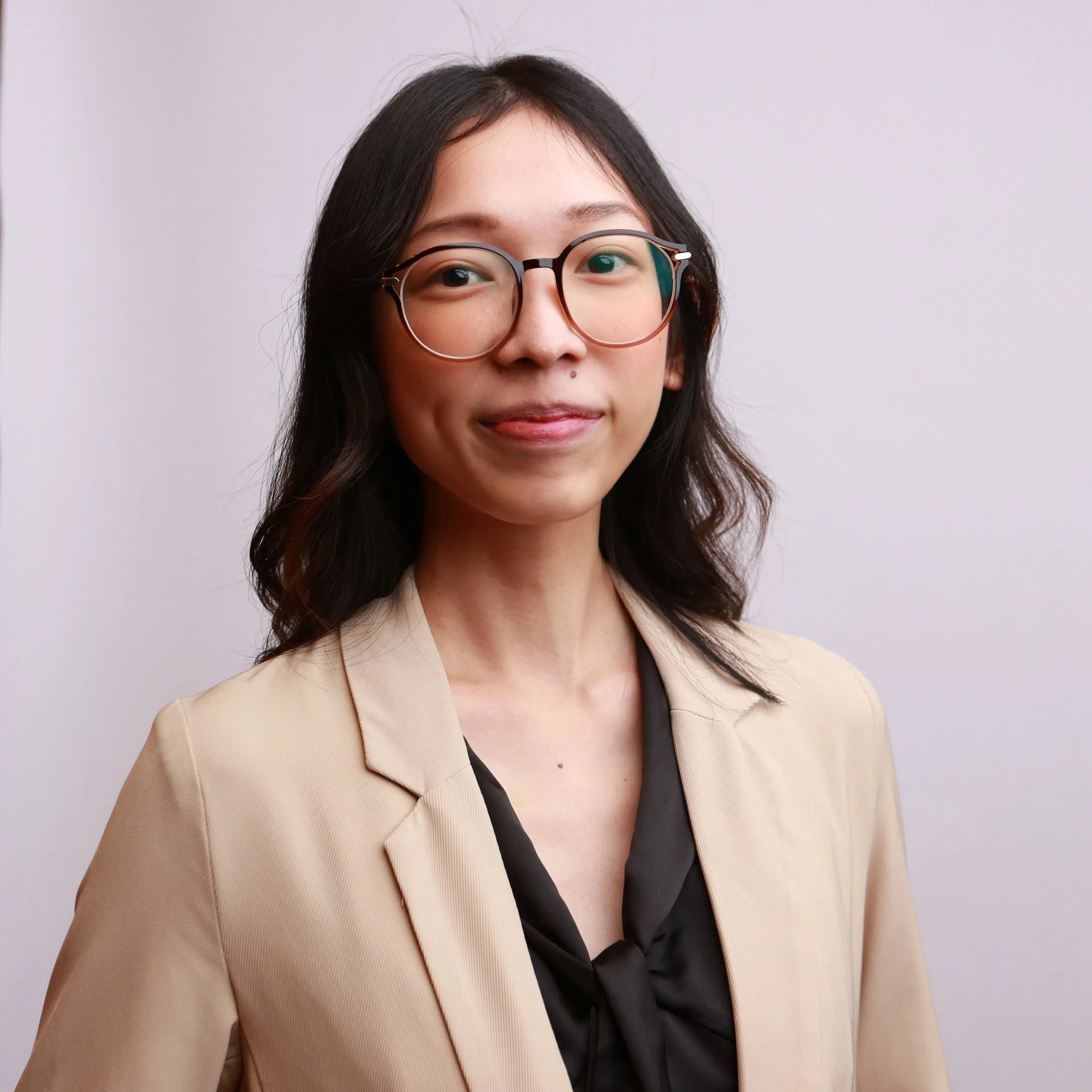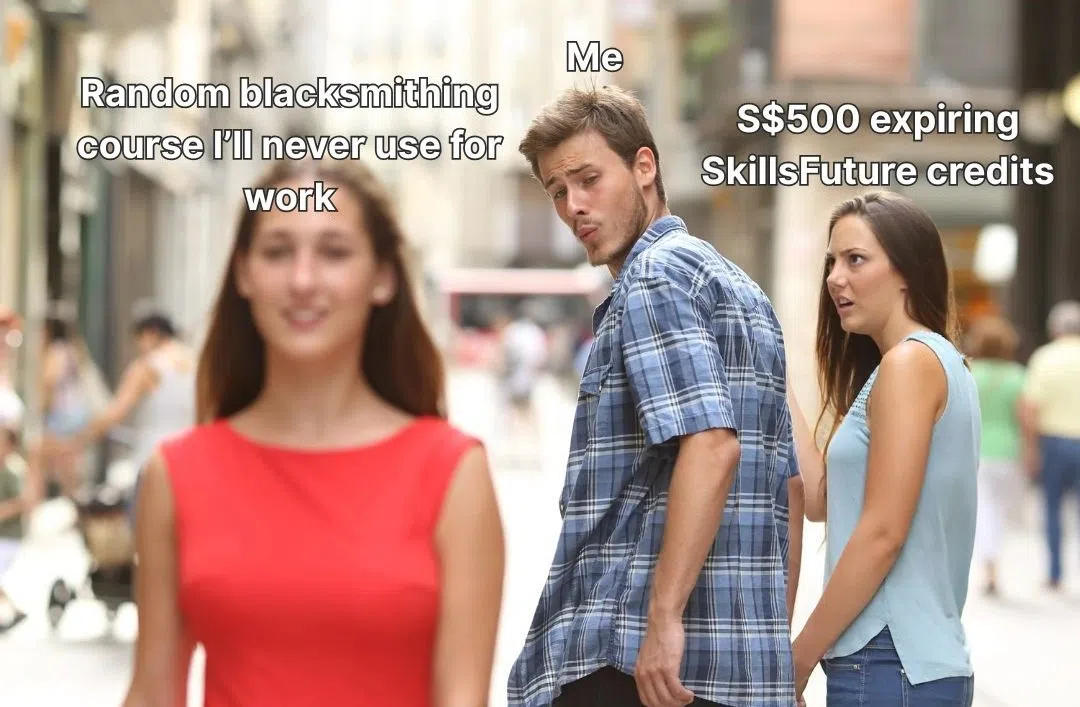🤹 Want their jobs? These are the skills they say you need

Straight to your inbox. Money, career and life hacks to help young adults stay ahead.
[SINGAPORE] I discovered something last week while logging into SkillsFuture to check if a blacksmithing course I was interested in could be paid for using my credits.
Yes, remember those S$500 SkillsFuture credits that were given out back in 2020? They’re expiring at the end of this year.
I’ve yet to take a single SkillsFuture course – and odds are, you haven’t either. With thousands of courses available, it’s hard to decide on what to pick.
To help you (and, frankly, myself) figure it out, I asked a few working professionals what the skills they think actually matter in their fields – and where they’d spend their SkillsFuture credits if they were starting out.
ICYMI: That one-off S$500 credit top-up was given only to Singaporeans aged 25 and above as of 2020. It’s separate from the usual S$500 you get when you turn 25, which doesn’t expire.
💊Pharmaceuticals & biotech

Timothea Ng, customer experience partner at Roche Pharmaceuticals
Navigate Asia in
a new global order
Get the insights delivered to your inbox.
Working in healthcare isn’t only about medical knowledge anymore. Increasingly, it’s about how it goes hand-in-hand with data.
“The healthcare industry is increasingly leveraging data insights and analytics to improve engagement with customers and key stakeholders,” says Ng.
Her pick for one must-have skill? Advanced data analytics.
In other words, making sense of large volumes of complex data from various sources to come up with insights that companies can act on.
At Roche, Ng uses analytics tools and artificial intelligence (AI) models to understand the needs of patients and healthcare professionals.
For young professionals looking to break into data analysis, she recommends picking up courses in data manipulation, statistical analysis, data visualisation and data management.
Courses that include hands-on practice with SQL and Python programming languages will be helpful, she adds.
🧠 Mental health & social work

Ether Kum, counsellor at Fei Yue Community Services
Not everyone wants to code – and that’s okay. (At least, that’s what I think a counsellor would say.)
If you’re considering social work or counselling, Kum believes it’s crucial to learn the qualities that help you build trust with people.
They’re what the profession calls microskills: empathy, active listening, paraphrasing, summarising and being fully present.
“These may seem simple, but they are the starting point of building trust with clients,” she says. And frankly, they’re pretty useful in any people-facing job.
Kum recommends a course like Practical Counselling (Basic), which teaches these foundational skills.
💼 Consulting

Bridget Wong, head of human resources at Accenture Singapore
If you want to break into consulting, knowing how to chat with ChatGPT might actually help.
Wong believes that one of the most valuable skills for young professionals is digital agility – that is, being able to quickly learn and adapt to new digital tools. Equally important is “human fluency”, which entails blending technical know-how with people skills like critical thinking and communication.
“Clients look to us to help them navigate complexity with clarity and confidence—especially as generative AI and other disruptive technologies reshape industries,” she says.
For a start, she recommends focusing on in-demand tech skills such as cybersecurity, critical thinking and digital literacy – particularly in areas such as generative AI.
Courses such as AI, ChatGPT in Emerging Technology and One Day CyberSecurity Awareness could help teach some of these practical skills, which Accenture itself has been training its own staff, as well as a recently announced mentorship programme for students.
🏦 Banking
Although I specifically asked for one skill young professionals should have, both bankers I asked didn’t stick to the brief.
Oddly enough, they both pointed to a growth mindset and the ability to adapt, rather than specific hard skills, like financial knowledge, that I had been expecting.
Fair enough. Traditional banking jobs have evolved so much that I’ve seen engineering and social science grads go straight into finance.
Take Muhamad Haikal Zahar, who says technical know-how wasn’t the most important skill when he made the switch from being an educator to a data and business specialist at DBS.
“What made the biggest difference for me were adaptability, resourcefulness and open communication,” he says.
Ernest Phang, managing director of group human resources at OCBC, thinks likewise. He says the bank values people who can adapt to change and show a willingness to learn and grow.
Sure, you don’t need a certificate to prove those, but if you want, there are plenty of courses on adaptability and growth mindset you can pick from.
🤷Not sure what to pick?
Not to sound like a SkillsFuture shill, but their Jobs-Skills portal has lots of resources to help you find out what’s in demand in different industries, once you get the hang of the website.
Better yet, message someone working in the field you’re curious about. You’ll be surprised how many are willing to help.
💡Pro-tip: If you don’t feel ready to commit to a course before your credits expire, consider using them on subscriptions to online learning platforms such as Coursera, Udemy Business and LinkedIn Learning. More details here.

And who says SkillsFuture has to be about work? Some Singaporeans have used their credits to learn floral arrangement, latte art, or even how to service their own air-con units (handy for avoiding those S$50 servicing fees).
The story of Steve Jobs comes to mind. In a 2005 Stanford University commencement speech, he talks about how he sat in for calligraphy classes while staying on campus after dropping out of his English major.
“None of this has even a hope of any practical application in my life,” said the co-founder of Apple. “But 10 years later, when we were designing the first Macintosh computer, it all came back to me.”
So, who knows? The next time you see me, I might be on the cover of Forbes as the founder of a blacksmithing unicorn company.
P.S. No, that blacksmithing course isn’t on SkillsFuture. Guess I’ll be paying out of pocket to fulfil my medieval fantasies.
TL;DR
- The one-off S$500 top-up from the pandemic days is expiring on Dec 31, 2025
- Data skills are hot across industries, even in healthcare
- Or pick up some soft skills, if you want to get into social work or even banking
- Not sure what course to pick? Use your credits for online learning subscriptions or take something fun
Decoding Asia newsletter: your guide to navigating Asia in a new global order. Sign up here to get Decoding Asia newsletter. Delivered to your inbox. Free.
Copyright SPH Media. All rights reserved.


